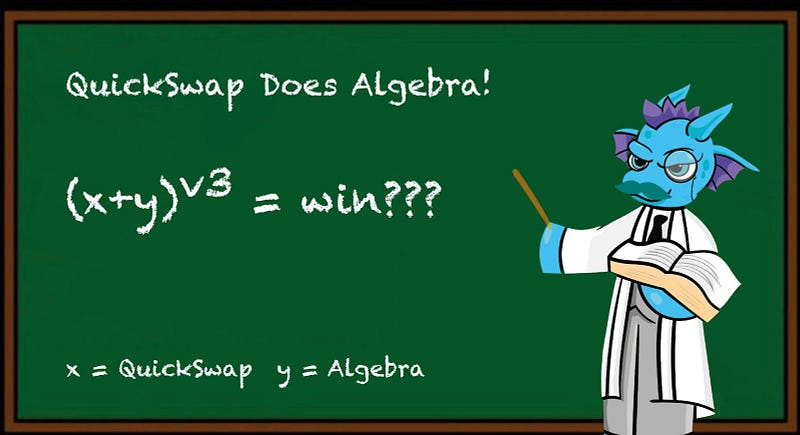In a compelling Twitter Spaces last week, Vladimir Tikhomirov (Algebra’s co-founder and CEO) joined Roc Zacharias (QuickSwap’s co-founder and CEO of Lunar Digital Assets), Nicole Grinstead (Mother of Dragons), and their communities to answer some of the most frequently asked questions about what QuickSwap’s acquisition of an exclusive license to operate Algebra’s V3 ‘Concentrated Liquidity’ model on Polygon means. Once the conversation got going, it flowed from a discussion about security to a more general conversation about Polygon’s expansion plans. Because some might find listening to the entire audio recording daunting, we’re provided an easy-to-follow recap below.
If you’d like to listen to the full conversation about how V3 will enhance your DeFi experience, you can do so here.
Questions & Conversation
First, Vlad and Roc introduced themselves to the audience. Then, we moved on to some questions
How are dynamic rate fees calculated & what ranges do they fluctuate between?
Vlad The fees of the swap depend on the pair’s volatility. For example, if we’re talking about a stable-stable pair like USDC-USDT in which there is little if any volatility between the assets, the swap fee is as low as 0.01% to attract more traders to this pool. For high volatility pairs, the fee may be as high as 2% for a short time, which you would see when an asset rapidly increases or decreases in value. Traders pay that fee, which is implemented to help compensate liquidity providers for any impermanent loss (IL) they may have experienced.
Nicole That’s good news for anyone who stakes QUICK in the Dragon’s Lair. Some people were concerned that the fees that are collected would decrease, but it sounds like there will be quite a bit of compensation for lower fees overall, so that’s exciting.
Kyber V3 just launched, and they’re also concentrated liquidity — what’s the difference between Algebra and Kyber?
Vlad Kyber developed their V3 using some ideas from Sushi and others from UniSwap. Unlike Algebra, they have predefined fees for the pools and no dynamic fees, meaning that liquidity providers either have to actively manage their LP positions or suffer high IL.
The same happens on Kyber, where you need to manually choose your pool for providing liquidity. It doesn’t help you avoid IL because the fees of the pools don’t change. If your pool has a higher fee, then you might have no volume, and you won’t get any rewards.
However, if you use the Algebra tech on QuickSwap, you will have only one pool for each pair. This makes it easier for liquidity providers. The dynamic fee system is superior to the current models, and our users will find it more convenient.
Nicole Yes, those dynamic fees are really what got us interested in Algebra. We had always been avoiding V3 conversations because we knew how high the risk of impermanent loss was and how V3s tended to benefit only active money managers.
Roc Something like 48% of liquidity providers on UniSwap V3 lose money due to impermanent loss. That’s because concentrated liquidity is a little more difficult to manage, and it requires active management as opposed to V2 passive management, but with Algebra’s dynamic fees, it seems that there will be a lot less impermanent loss. A big point of the dynamic fees is to help the liquidity providers from losing money.
Discussion about Dynamic Fees and Impermanent Loss
Vlad Unfortunately, it is still possible to suffer from impermanent loss because of high volatility in the market.
Due to this mechanism, we should accept that concentrated liquidity is riskier than QuickSwap or other V2 DEXs right now, but it’s important to remember that you — as an LP — can choose your own risk. You can select a short range to earn higher rewards and have a higher risk of IL, or you can choose a wider range with lower rewards and lower risk.
How solid are Algebra’s smart contracts? Recently, I heard about a V3 concentrated liquidity DEX on Solana getting hacked. What are the risks?
Vlad This was one of the first things we discussed with QuickSwap. We talked about cooperation and security.
We had done an audit with Hacken in December 2021. We’re waiting for the result of two more audits now. One of them is almost complete.
Security is a top priority for us, and we want to do everything we can to ensure that there are no vulnerabilities.
Nicole When we announced this partnership, we mentioned that we would probably invite select community members to test the V3 on our dev net before we make it available to everyone on the main net.
What qualifications will we use to select the community members to test our V3?
Roc We would love to start by having our Dragon Riders test the protocol. If you are a QuickSwap supporter, and you’d like to be more involved, applying for the Dragon Riders ambassador program is a great way to do that. We may open it up from there to more testers.
We’re just working on integrations and testing now. The tech that Algebra has built is incredible, and together with QuickSwap, we’re going to build it at scale. They’ve proven their efficiency at a small scale — their APYs, yields, and efficiency are pretty remarkable.
Have you done any tests and simulations on Algebra protocol? What were the results when using the concentrated liquidity model?
Vlad As a liquidity provider, two parameters affect your revenue. One of them is the DEX’s trading fee. The second parameter is the volume. It means that if you provide liquidity for a pair that has great volume, you get more rewards.
We experimented and copied one of the pairs that have $1 million liquidity on QuickSwap. We created the same pair on Algebra, but with only $25,000 liquidity. In one day, Algebra got more volume than all other DEXs on Polygon. The LP providers saw a 10x APR when using Algebra compared to traditional V2 DEXs.
We estimate that after we implement the V3 model on QuickSwap, we will see a trading volume of $100 million per day.
Roc We were behind where the industry was moving with this concentrated liquidity. But QuickSwap has an incredible community and more daily users and transactions than almost every DApp on Ethereum. We have the marketing. With Algebra’s tech, this is really a match made in heaven.
How will the partnership benefit $ALGB token holders?
Vlad We continue to generate fees on all trades. ALGB stakers will receive 15% of all trading fees collected on QuickSwap, with the remaining 85% split between QuickSwap V3 LPs, QUICK stakers, and the QuickSwap Foundation.
Some of the other questions and topics that were discussed during this AMA include
- How QuickSwap plans to become the most efficient DEX in the industry
- What Algebra is working on next
- QuickSwap going multi-chain in the future
- And more
To listen to the entire AMA session with Algebra, head over to Twitter and hit play — https://twitter.com/QuickswapDEX/status/1546924510808461312
Let us know if you have any questions about our partnership with Algebra in the comments, and join us across social media to stay up-to-date on all things QuickSwap — Polygon’s most-established DEX.
Twitter | Telegram | Announcements | Medium | Discord| Reddit








